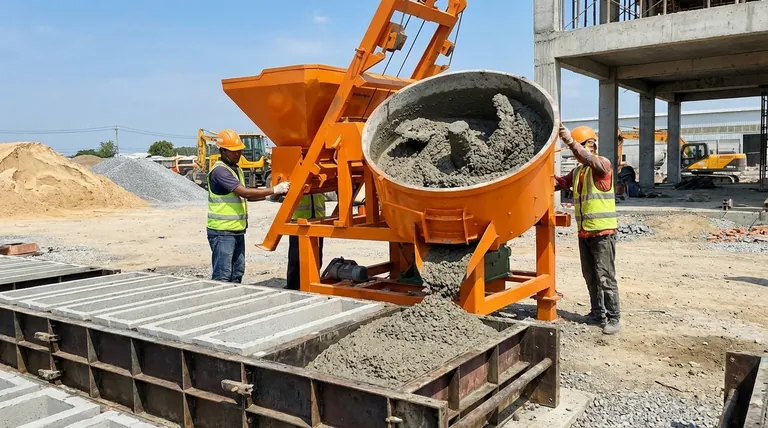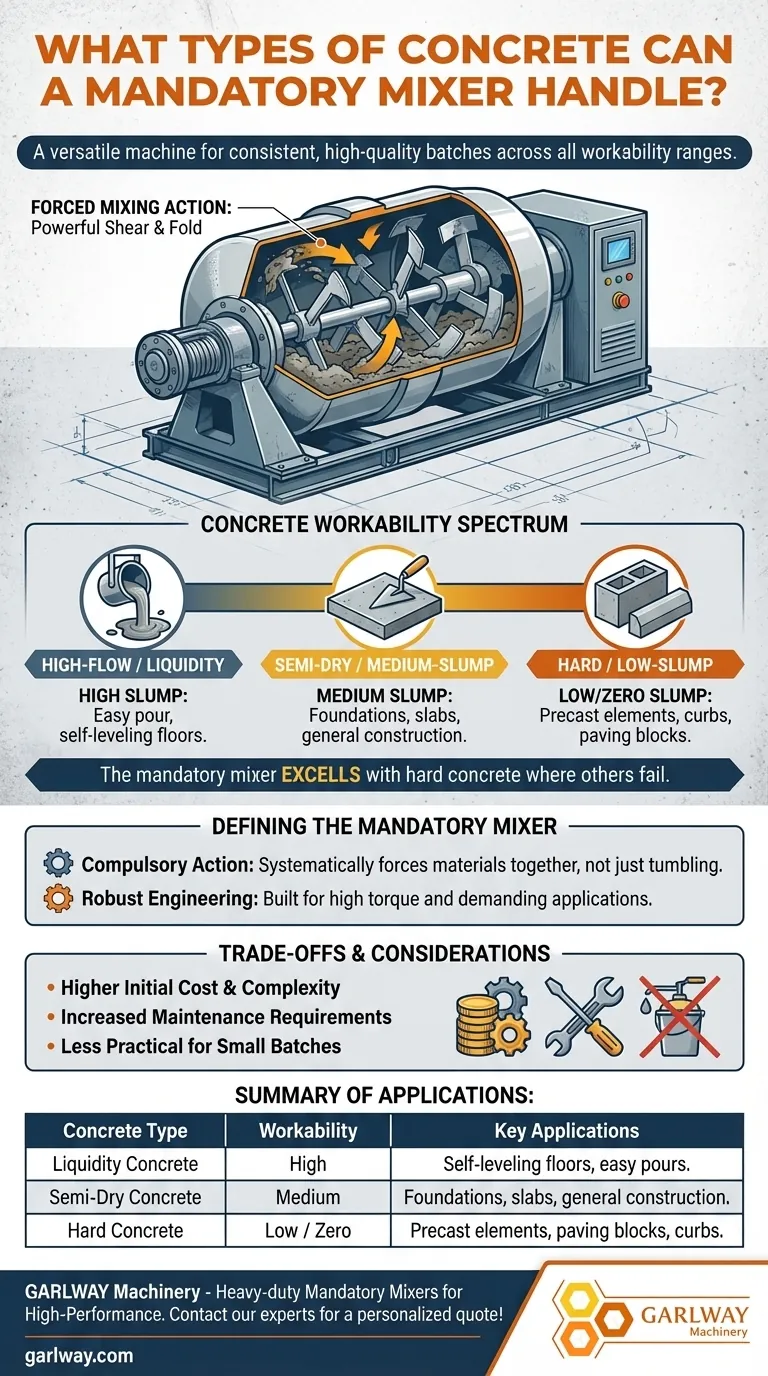In short, a mandatory concrete mixer is a highly versatile machine capable of handling a wide spectrum of concrete types. Its design allows it to thoroughly combine materials for everything from high-flow liquidity concrete to very stiff semi-dry and hard concrete mixes that simpler mixers cannot process.
The key takeaway is not just what a mandatory mixer can handle, but why. Its "compulsory" forced-mixing action provides the power and shear force necessary to produce consistent, high-quality batches across the entire range of concrete workability, especially with difficult low-slump mixes.

What Defines a Mandatory Mixer?
The term "mandatory" or "compulsory" refers to the method of mixing. Unlike a common drum mixer that simply tumbles ingredients by gravity, a mandatory mixer uses a powerful, systematic process to force the materials together.
The Forced Mixing Action
A mandatory mixer features a stationary drum containing a system of rotating paddles, blades, or stars. This internal mechanism actively shears, folds, and kneads the aggregate, cement, and water together. This guarantees every particle is coated in cement paste, resulting in a homogenous and high-quality mix.
Robust Engineering for Tough Jobs
These mixers are built for demanding applications. They incorporate heavy-duty components like powerful gear reducers, advanced shaft-end seals, and often automated lubrication systems. This robust construction is necessary to generate the high torque required to mix stiff, low-water-content concrete without stalling or failing.
A Closer Look at the Concrete Types It Handles
The forced mixing action is what unlocks the machine's versatility, allowing it to produce concrete with vastly different properties.
Liquidity Concrete (High-Slump)
This is a very wet, high-flow mix that can be poured easily and is often used in applications requiring self-leveling properties. While a mandatory mixer handles this with ease, its full capabilities are not required for such a simple mix.
Semi-Dry Concrete (Medium-Slump)
This represents the most common range of workable concrete used for foundations, slabs, and general construction. A mandatory mixer excels at producing a consistent, high-quality batch of this type quickly and efficiently.
Hard Concrete (Low-Slump / Zero-Slump)
This is where the mandatory mixer proves its essential value. Hard concrete has a very low water-to-cement ratio, resulting in a stiff, dense mixture that is difficult to combine. This type is specified for high-strength applications like precast structural elements, curbs, and paving blocks. A standard drum mixer cannot generate enough force to mix it properly.
Understanding the Trade-offs
While highly capable, a mandatory mixer is not the right choice for every scenario. Understanding its limitations is key to making an informed decision.
Higher Initial Cost and Complexity
The powerful motors, gearboxes, and robust sealing systems make these mixers significantly more expensive and mechanically complex than simple gravity-fed drum mixers.
Increased Maintenance Requirements
The presence of components like shaft seals and dedicated lubrication pumps means there are more potential points of failure and a more involved maintenance schedule is required to ensure long-term reliability.
Less Practical for Small Batches
Mandatory mixers are typically larger, stationary units designed for high-output production. They are generally not practical or cost-effective for small-scale, intermittent work or DIY projects.
Making the Right Choice for Your Application
Selecting the correct mixer depends entirely on the specifications and goals of your project.
- If your primary focus is high-strength precast or paving: A mandatory mixer is essential for properly mixing the required low-slump and hard concrete.
- If your primary focus is high-volume general construction: A mandatory mixer will deliver superior consistency and speed for medium-slump concrete.
- If your primary focus is small-scale DIY or repair work: A mandatory mixer is overkill; a portable gravity drum mixer is the more practical and economical choice.
Ultimately, choosing a mandatory mixer is an investment in quality and capability for projects that demand absolute consistency and high-strength performance.
Summary Table:
| Concrete Type | Workability (Slump) | Key Applications |
|---|---|---|
| Liquidity Concrete | High | Self-leveling floors, easy pours |
| Semi-Dry Concrete | Medium | Foundations, slabs, general construction |
| Hard Concrete | Low / Zero | Precast elements, paving blocks, curbs |
Ready to invest in quality and capability for your high-strength projects? GARLWAY specializes in heavy-duty construction machinery, offering robust mandatory concrete mixers designed for contractors and construction companies who demand absolute consistency and high-performance mixing. Our mixers deliver the power and reliability you need for tough jobs. Contact our experts today to find the perfect mixer for your specific application and get a personalized quote!
Visual Guide

Related Products
- Hydraulic Concrete Mixer Machine Cement Mixing Equipment for Mixture Concrete
- Commercial Construction Mixer Machine for Soil Cement Mixing Concrete
- HZS75 Concrete Batching Plant Cement Mixer Price Concrete Mixer Bunnings Mixing Plant
- Construction Products Concrete Plant Machine Mixing Concrete Mixer
- HZS25 Best Cement Mixer for Quick Mix Concrete at Bunnings
People Also Ask
- What are the three common methods for mixing PCC in truck mixers? Optimize Your Concrete Delivery
- How do self-loading mixers contribute to environmental sustainability? Reduce Emissions & Waste On-Site
- How can a concrete mixer be used to remove rust from metal parts? A Powerful, Large-Scale Cleaning Method
- What types of concrete are efficiently mixed in tilting drum mixers? Ideal for Large Aggregates & Stiff Mixes
- What components are involved in the loading process of a self loading concrete mixer? A Guide to the Key Systems
- In what types of construction projects are self-loading mixers commonly used? Ideal for Remote Sites & Urban Repairs
- What types of materials can a rotary drum mixer handle? A Guide to Versatile Mixing
- What is a drum mixer and how does it function? A Guide to Gentle, Efficient Blending



















